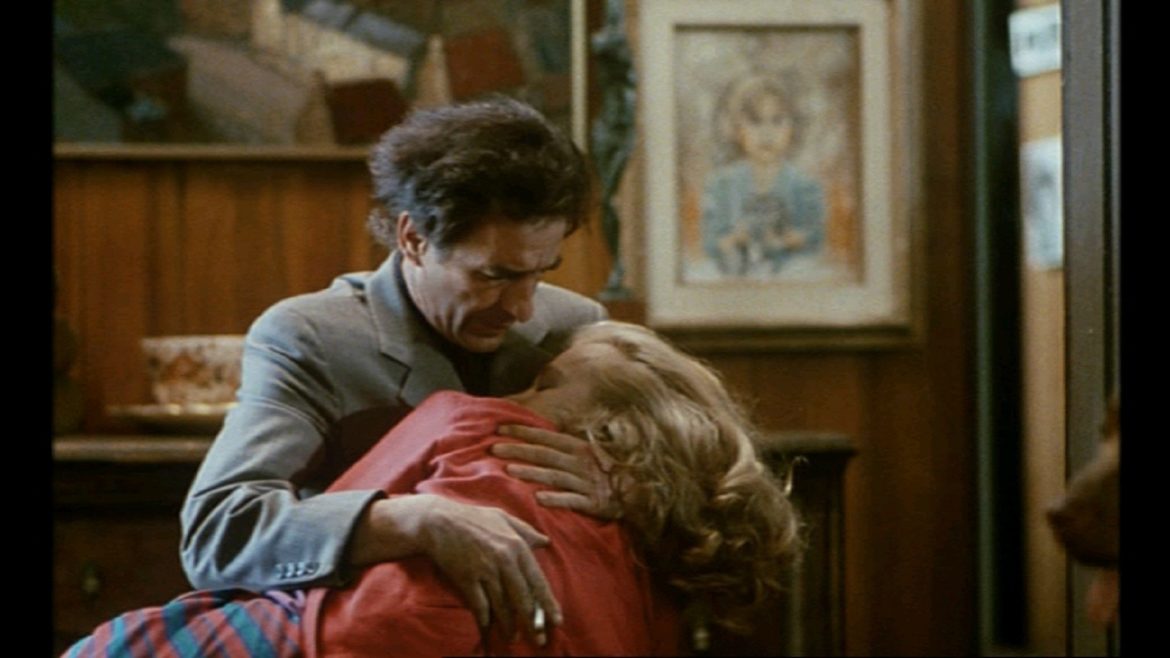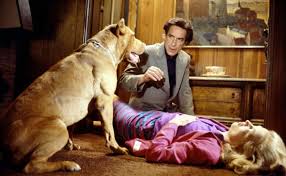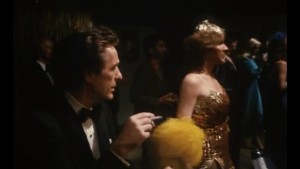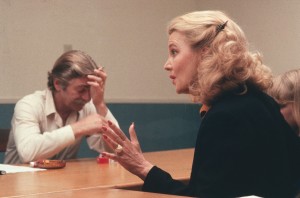The guys who brought you Death Wish 3 also produced Franco Zeffirelli’s Otello. They held a black-tie gala in a parking garage for the release of the Chuck Norris-tastic Delta Force, easily one of the most racist pieces of jingoistic nonsense ever afflicted on a non-war time population, while also releasing Barbet Schroeder’s Barfly, an underperforming gem based on a script by gutter-poet Charles Bukowski.
And in 1984, the same year Cannon wasted the good will generated by its first Breakin’ by soiling its own legacy with the ludicrously-titled Breakin’ 2: Electric Boogaloo, they financed and released Love Streams, arguably the greatest film from John Cassavetes, one of the true originals in American independent cinema.
Notoriously difficult to work with from the get-go, Cassavetes was dying of cirrhosis of the liver during its production. His portrayal of an aging playboy and artist, locked into alcoholism and manic attempts to generate meaning from a life that seems emptier by the minute, is almost brutal in its realism and introspection. This is a hard movie to watch, if only because you get the sense you are watching a genius murder himself on screen. And it’s a fucking Cannon Films production.
There’s a certain kind of sense to it, though. Menahem Golan, Cannon impresario, desperately wanted Cassavetes on his resume, and was entirely willing to allow for his hijinks and bullshit, if it meant he got to see his logo right before the film started. This was crucial, and served a purpose. It seemed to say, “Yes, we make the worst movies around, but we also make important ones.” It was a shrewd move, and totally in line with Golan’s vision of himself as a patron of the arts (arm-wrestling movies and skin flicks notwithstanding).
In I’m Almost Not Crazy, the behind-the-scenes doc that accompanies Criterion’s version of Love Streams (a film virtually lost for two decades), you hear Golan relate that he screened the film, loved it, but asked that Cassavetes trim 15 minutes out of it for release. Cassavetes agreed … and returned with a movie that was 15 minutes longer. “It’s shorter, nevertheless,” he explained. Golan laughs when he tells the story. Buy the ticket, take the ride.
In Love Streams, Cassavetes (casting himself at the last minute in the lead) is Robert Harmon, a successful author of books about women. (We don’t know much about these books aside from that, and that they are lurid.) His work mirrors his life – he lives in a large house (Cassavetes’ actual house served as the set) filled with hookers who come and go, beloved by their benefactor … until they’re not. It’s not even clear if he fucks them. He just seems to like having them around, and occasionally interviewing them for material. He haunts gay clubs because he likes the performers. He drinks way, way, way too much, charms and abuses people in equal measure, passes out in strangers’ houses, barely makes it home every night. One day, a former lover deposits a son on his doorstep, who he promptly decides to take to Vegas, and just as promptly abandons to the hotel workers. He’s, in short, a fucking mess.
Gena Rowlands, Cassavetes’ real-life partner and frequent collaborator, is Sarah Lawson, an unhinged woman going through a messy divorce and custody dispute. It takes more than an hour and a half to find out she’s Harmon’s sister. Their stories run in parallel, and only eventually, casually merge. Rowlands is masterful, suggesting both the damaged aspect and the fundamental integrity of her character. She moves in with her brother, and the two set about finding something true and real in their lives of artifice and shallow entitlement.
Both characters have children, but neither seems remotely close to the kind of responsibility parenthood entails. Hell, they’re barely adults themselves. A long, improvised scene finds Rowlands playing a desperate game of “make ’em laugh” with her daughter and ex-husband – in excruciating long takes, Cassavetes allows Rowlands to strip herself bare emotionally, trying and failing to elicit a moment of frivolousness and fun with people who are just completely over her bullshit. It might be the single most awkward and bruising sequence I’ve ever seen in a movie. You want to leap into the movie and help.
But of course you can’t. That’s not how movies work, and Cassavetes is only too happy to remind you of this. Eventually, the brother finds himself caring for a bunch of animals his sister bought him – she reasons he “needs a baby,” and delivers him more than a few. As goats and dogs roam the premises, the siblings’ joint madness subsides into a kind of domesticity … and then she leaves, impulsive as ever, with a lover she found in a bowling alley. Cassavetes remains, hallucinating in an empty living room, whiskey by his side, cackling maniacally.
What is so funny? Apparently, he didn’t explain the scene to anyone else, and the crew was genuinely alarmed at his laughter, which goes on seemingly forever and is, frankly, odd and disturbing all these years later. It’s the laugh of a man who has given up on the notion of tears. Rain beats down in almost ludicrous volume, pounding the house. The dog his sister left morphs into a bearded man, who smiles knowingly. Cassavetes laughs and laughs some more.
In its closing frames, Cassavetes doffs his hat and waves out the window. He literally says goodbye to the audience, and then, outside of celluloid, goes off to die. It is not too often that an artist actually signs off in this fashion. But Cassavetes did, and the folks at Cannon – the most disreputable production house outside of pure porn – made it happen. It’s an incredible thing.
Cannon, the most divisive production company of all time, produced the final “personal film” of John Cassavetes, one the most divisive directors in U.S. history. What seems, at first, to be inexplicable turns out to be completely appropriate.
We can laugh all we want at Over The Top, but if it paid for Love Streams, I call it a win. God bless Cannon Films.





